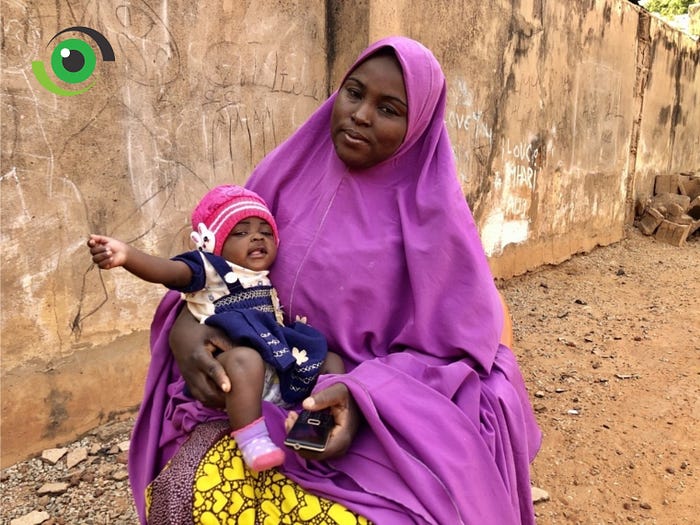Albishirin Ku: Community Dialogues for better Mother and Child Health in Sokoto
By Bashar Abubakar (Lead Writer)

Shafa’atu Abubakar, 37, is a mother of ten who lives in Ubandoma, Sifawa town, Bodinga Local Government in Sokoto State. In January 2020, she gave birth to her 10th and last child at the primary health centre in Ubandoma. It was her first experience giving birth at a health centre. Abubakar says prior to this she never considered antenatal care or giving birth at the health centre important, even though she has a secondary school education and knew there was a primary health care centre (PHC) in her town. ‘’I never really took antenatal as a priority, talk less of delivering at the hospital. I didn’t attend any antenatal in most of my pregnancies,’’ she said, during a gathering with some women in her neighbourhood where they discussed the importance of antenatal visits, delivery at the health centre and child spacing.
These gatherings, known as Compound Visits, are one of three components of a campaign tagged Albishirin ku (Glad Tidings) being implemented in 11 local government areas (LGAs) in Sokoto State through the Breakthrough ACTION Nigeria (BA-Nigeria) project funded by the United States Agency for International Development (USAID). As with many other states in northern Nigeria, health facility delivery is not popular with women in Sokoto State. The 2018 National Demographic Health Survey shows that only 7.8 percent of women in the state deliver at health centres, even though 24.3 percent of women attend antenatal. Only 2.1 percent of women in the state are using a modern contraception method to space births.

Albishirin Ku is a social and behaviour change campaign launched in 2019 to create and sustain demand for Maternal, Newborn and Child Health (MNCH) and Reproductive Health (RH) services, and improve overall health seeking behaviours especially in the rural areas of the selected LGAs. The campaign uses community volunteers (CVs), who are members of the community, to create awareness about the benefits of various components of MNCH and RH behaviors through one on one and group discussions with women and men, and through advocacy to community and religious leaders. Each ward has between three to five CVs depending on its size. The CVs, who must have at least a secondary school education, are selected on the recommendation of ward traditional leaders. Abubakar is one of the CVs in her ward.
To make the messaging less cumbersome and more appropriate, men and women of reproductive age in the communities are categorised into four groups or life stages:
- Life Stage One: Women in early stage of pregnancy (6 months or less) and their partners.
- Life Stage Two: Women in late pregnancy, birth and the first weeks after birth and their partners.
- Life Stage Three: Couples with infants and children under five years.
- Life Stage Four: All other couples of reproductive age who are currently not pregnant.
In addition, husbands are engaged separately.
Household visits are targeted at community members in life stage one and two. CVs map out houses with pregnant women and women who have recently given birth. At the beginning of each month, they select settlements to visit. During the visits, they ask to speak with the women and their husbands together. In the husband’s absence, the next available family decision maker, such as the husband’s mother, is asked to join the discussion. The discussions centre on the benefits of six interventions: antenatal and postnatal visits; giving birth at a health facility; eating nutritious foods which can be sourced locally; exclusive breastfeeding; immunisation, and child spacing.

Harnessing the Power of Community Dialogue
In Sokoto, and other conservative Northern Nigerian states, men, as husbands, brothers or fathers, play a significant role in deciding if, when and where a woman should seek healthcare. Besides being the breadwinners in most families, men tend to be the ultimate decision makers. To create demand about MNCH and RH services amongst the men, a community dialogue involving only men is carried out in the communities. Community leaders are used as entry points to mobilise men. At the beginning of the month the male CVs in every ward map out the settlements and dates to carry out these dialogues. Community leaders of the settlements are informed ahead of time, and in turn inform and mobilise their male community members for the meeting.
Umar Sambo is a CV in Fajaldu village, Dange Shuni LGA. He arrives Waramu settlement just after 9 o’clock on a Monday morning, carrying a flipchart with a dialogue framework and illustrations on the health topics. Several men, mostly middle aged, are gathered in front of a mud house waiting for him. “What can anyone tell us about this picture?” Sambo asks in Hausa language after exchanging greetings with the men and introducing himself. He points to an image of a pregnant woman on the first page and begins a discussion about pregnancy and how it impacts a woman’s life and family. The interactive discussion progresses to antenatal visits, light exercise and eating locally available nutritious foods, which all help the woman have a healthy pregnancy.
They also discuss exclusive breastfeeding and again, Sambo uses images to show its benefits to both mother and child. In a somewhat tactical introduction of child spacing into the discussion, Sambo displays different pictures of couples with children. The first set has many children of almost the same age and the second set has a few children with clear age gaps between them, playing in a household. The men take turns to express admiration for the family in the second set of images. A long discussion on the benefits of child spacing for both parents and children ensues. “Spacing our children will obviously give us more financial flexibility,’’ says Muhammad Mudi, a father of five. The discussion ends with conversations about various contraceptive methods, and how they can be accessed at health facilities.

Compound Meetings, like the one Abubakar attends, are designed for women in life stages three and four. Every settlement has a meeting point and a woman leader who coordinates the meetings. In these meetings, the benefits of child spacing are emphasised says Nura Aminu, Program Officer, Social Mobilisation of Albishirin Ku. The targeted women are not pregnant, but since they are still within reproductive age, providing them with knowledge of child spacing ‘’is like planting a seed in a fertile land,’’ he says. Other areas such as antenatal and postnatal visits, immunisation, nutrition and facility delivery are also discussed, to instil lifelong knowledge that could be passed to other women. As with community dialogues, at the beginning of each month, the CVs map the settlements to conduct meetings in and inform the women leader who brings the women together.
Connecting the community to health services via a referral system
After every session, the CVs offer referral cards to the women; the cards give them access to routine malaria medication, mosquito nets and family planning commodities, all free of charge. The drugs and commodities available at the PHCs are provided by the government and BA-Nigeria has an agreement with providers at the pHCs to register women who presnt the referral cards and provide them with the commodities.
Hamisu Muhammad, facility-in-charge of Kammata PHC in Wammakko LGA, believes the messaging and issuance of referral cards are helping to create awareness and improve demand for family planning commodities in Kammata village. ‘’There has been an increase in the number of women coming with the cards requesting for family planning commodities every month,’’ he said, adding that knowledge and views about family planning among community members has appreciated significantly over the last year.

Alhaji Abubakar Ubandawaki agrees. He is the district head of Kammata, and said the community dialogues have provided an opportunity to correct negative perceptions about family planning especially among the men in the community. ‘’We now see its benefits instead,’’ he said, adding that, ‘’A lot of our men now allow their wives to use the commodities to space their children’’. In addition to improved patronage of family planning commodities, men also come around for condoms, says Hadiza Samaila, facility-in-charge of the PHC in Fajaldu, another community where the intervention is taking place.
Breakthrough ACTION’s use of community dialogues to encourage positive behavioural changes around MNCH and RH in rural communities certainly appears to be one way to change deep-rooted beliefs and practices that are detrimental to the overall wellbeing of women and children. The use of community members as messengers has made the messages more acceptable to the people. Targeting men who are usually the key decision makers in families in northern Nigeria could be key in overturning the low demand for MNCH and SRH services in these communities.
However, while carrying out these discussions, CVs must be conscious of time. Some community dialogues and compound meetings last so long that eventually the community members might lose interest. Sustaining the gains of Albishirin Ku even after the end of BA-Nigeria should be a priority. In this regard, governments at state and LGA level could be incorporated as partners in the implementation of the project. Afterall, sensitising community members about healthy habits and provision of antenatal and postnatal care, as well as providing family planning commodities are the responsibility of the LGAs.

For Abubakar, the knowledge acquired through Albishirin Ku is already yielding results as she had her shortest labour three months ago. She said she went to the hospital immediately she started experiencing labour signs and delivered within an hour of getting to the hospital. This is unlike her past 9 deliveries where she said she could go up to 12 hours before delivering at home. ‘’None of my children were as healthy as this girl is at three months. I believe it’s because of the exclusive breastfeeding I am practicing now. I am also using contraceptives now and I will continue using them as I don’t want to get pregnant in the foreseeable future,’’ she concluded.
Where else have you seen community level involvement yield positive results for maternal and child health services? Let us know on our social media platforms, @nighealthwatch on Twitter and @nigeriahealthwatch on Facebook and Instagram.
